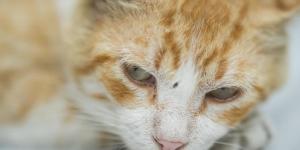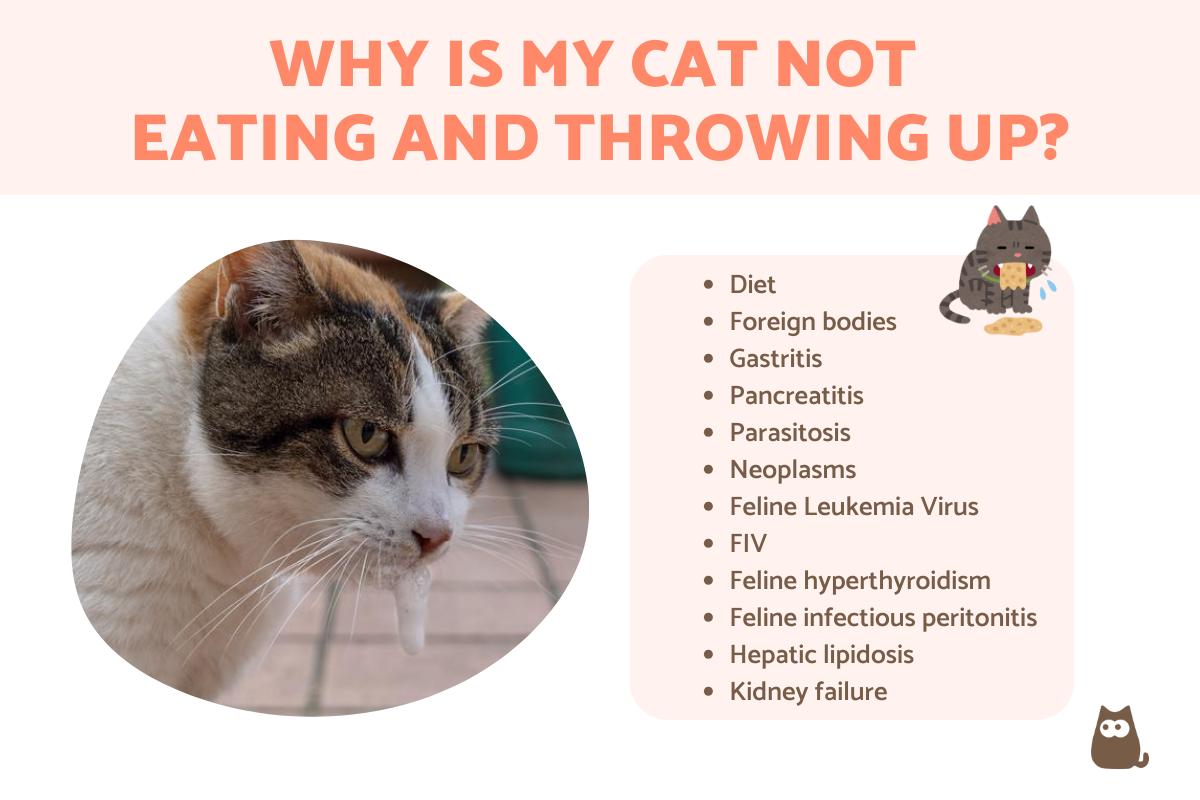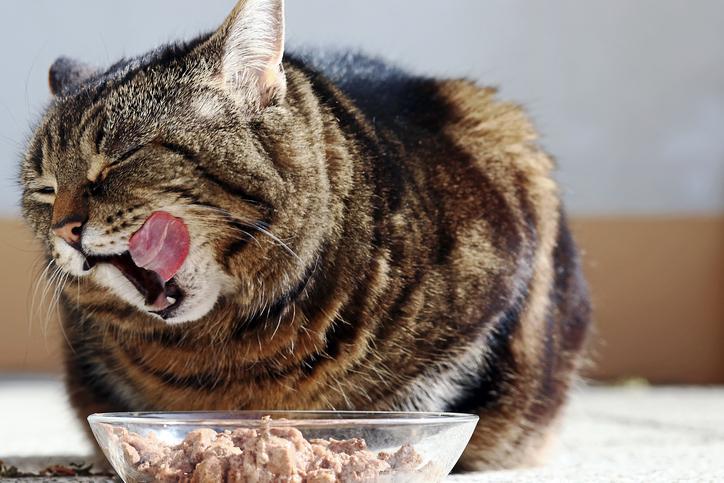Why Is My Cat Not Eating and Throwing Up?



See files for Cats
Cats with gastrointestinal issues are some of the most common patients in veterinary clinics. Vomiting is one of the most common symptoms of these issues, but there are many types and many concurrent symptoms. Similar symptoms can present for very different diseases, meaning veterinarians have to be careful in their diagnosis. for example, f a cat loses their appetite, but is throwing up, we will soon see them throwing up bile because there is nothing in their stomach. This nausea can help a vet make an accurate differential diagnosis for the cat.
AnimalWised asks why is my cat not eating and throwing up? We look at the causes and treatment of these concurrent symptoms to better understand what we can expect from a veterinary assessment.
Why is my cat not eating and throwing up?
When a cat begins to experience persisten vomiting, there is a high possibility they will suffer appetite loss. It is also possible your cat can lose their appetite without vomiting. If the cat is not taking any medication at the time, it is likely that rejection of food will be part of the clinical picture. Inappetence (loss of appetite) is something which needs to be resolved in any animal. I cats this is especially so due to their sensitivity and possible liver damage it can cause.
Many factors can lead to a cat losing their appetite, whether gradual or abrupt. However, if we see our cat is throwing up a the same time they lose their appetite, this is a sure sign there is a problem. A veterinary consultation will be necessary when the cat is vomiting and not eating for more than 24 hours.
When the cat is taken to the veterinarian, they will carry out different diagnostic tests to determine the underlying cause. They will look to see if the cat is in any discomfort or pain, perform a physical examination to see if they can find any inflammation and ask for the context of their condition, e.g. if they have had a loss of appetite.
The most frequent causes of vomiting and lack of appetite in cats are the following:
- Diet: cat owners often come to the veterinary clinic with an animal which has been vomiting regularly. If loss of appetite is also persistent, one of the most common causes is an insufficient diet. This could be due to the cat having certain nutritional requirements which are not met by the cat food you buy. It is also possible that you have decided to provide them a homemade diet, such as the BARF diet. These can be dangerous as some owners do not provide the full nutritional requirements of the cat. Similarly, feeding food to cats which is of poor quality can lead to gastrointestinal issues.
- Foreign bodies: sometimes a foreign body or object can block the digestive tract. This means food which goes down can't be digested and is brought back up. The reason for ingesting a foreign object could be due to accidentally eating something they shouldn't have or the dead hair they lick off their bodies combining to form a hairball.
- Meal frequency: not all animals have the same eating habits. The guardian needs to know how much the individual cat will need in terms of both quality and quantity of food. One problem which can lead to cats throwing up and not eating is feeding them too much in one sitting. Cats usually regulate their own intake, but it is possible they will eat too much then later be unable to eat or even throw up. Another issue is in a home where several cats reside, one cat may eat another's food. To solve this, you can place food dishes in separate parts of the home. If the problem is because the cat eats too quickly, then you can divide their food into smaller portions.
- Gastritis: this is the inflammation of the stomach, something which can occur to either prolonged fasting or eating food of poor quality. In these instances, we will need to check their diet to ensure it is meeting all of the cat's nutritional needs. It is better to give cats with gastritis smaller amounts of food more frequently. This is in part because when the cat anticipates eating, they produce stomach acid which can aggravate gastritis.
- Pancreatitis: the pancreas produces enzymes necessary for digestion. When this function is compromised, the quality of life of the feline decreases markedly. One of the characteristic signs of pancreatitis is persistent vomiting.
- Parasitosis: among many symptoms, an infestation of parasites can cause vomiting and loss of appetite. Diarrhea is also a common symptom. There are many different types of internal parasites in cats which act in different ways. They can also be a cause of gastritis, detailed above.
- Neoplasms: a neoplasm is any type of abnormal growth caused by cells replicating improperly. This can take various forms including tumors, both malign and benign. The result will be vomiting in cats and often inappetence occurs due to the blockages caused by the neoplasm.
There are other pathologies that are not closely associated with the digestive tract and that can cause the cat to vomit and not eat, such as:
- Feline Leukemia Virus
- Feline Immunodeficiency Virus
- Feline hyperthyroidism
- Feline infectious peritonitis
- Hepatic lipidosis
- Kidney failure

My cat throws up and doesn't eat or drink
While a cat will not survive without eating food, not drinking water will hasten their death significantly. If your cat is vomiting and neither eating nor drinking, their life is in serious threat and action needs to be taken immediately.
However, it is also important to note that even healthy domestic cats will not necessarily drink a lot of water. This partly concerns their diet. If a cat eats mainly wet food, they will need to drink less water than if they only ate dry food. The domestic cat's biology allows it to hydrate from their food as a survival mechanism. However, they will still need to drink some water.
If your cat not only stops drinking water, but also throws up, it is most likely due to the presence of a systemic disease. The same thing happens with vomiting and a loss of appetite as it does with not drinking any water. Not drinking water could be due to renal failure, a viral disease or any medical problem which threatens the overall well-being of the cat.
What can I do if my cat does not drink water?
There are several reasons why your cat isn't drinking water. When vomiting is concurrent or they are showing obvious signs of dehydration, you will need to take the cat to a veterinarian. Since this shows there is likely an underlying disease, hey will need to carry out various tests. They may even need to implement emergency care, depending on how far the dehydration has progressed.
An otherwise healthy cat may also stop drinking water, although they will not also be vomiting. This may have to do with how you provide water for them. Here are some tips to encourage the cat to hydrate properly:
- Change the water regularly: if the water in their bowl is left standing for too long, it is posible the cat will not want to drink it. This may also happen if it is at the wrong temperature. Replenishing the water regularly can help the cat to drink more water,.
- Do not move the water bowl: if the cat is used to their water being in a certain space, it is possible the act of moving it can cause them stress. It is also better to have more water bowls or even drinking fountains to encourage hydration.
- Offer better water: cats are individuals and what some will tolerate, others will not. While one cat will be happy to drink out of a puddle in the yard, others may refuse to drink water from the faucet. This could be due to chemicals in the water or even flavor issues. You can try a different type of water in case this is the problem.
If you have implemented these measures, but the cat is still refusing to drink water, you will have to take them to a veterinarian. Even if there are no other obvious symptoms, a lack of hydration can cause organ failure and will eventually lead to death.
My cat is not eating and throwing up yellow bile
Although there are various reasons why a cat will vomit, looking at the quality of the vomit might also help us know which one it is. For example, if we see there is blood in the vomit, this is a serious sign of possible rupture, infection or another life threatening condition. If we see there is a lot of solid food which is poorly chewed, it is likely the vomiting is due to indigestion caused by eating too fast.
When the cat stops eating and throws up a yellow substance, this is likely an indication there is no food left in the stomach. The yellow color is due to the presence of bile which has entered the stomach due to a lack of food. The bile may also be greenish in color. However, it is also possible that pancreatitis or liver damage has caused bile to enter the stomach. Only a veterinarian will be able to determine the root cause of the problem.

My cat throws up white foam and doesn't eat
Prolonged fasting is the primary cause of vomiting white foam in cats. This is because the hormone gastrin promotes the production of gastric acid (including hydrochloric acid and sodium chloride) in an empty stomach. To relieve the discomfort, the cat will throw up. White foam is produced, but usually in conjunction with the aforementioned bile.
If the cat's owner let's this happen too often, for example by not providing enough meals, the cat is likely to develop chronic gastritis. This will seriously affect the cat's quality of life, especially as it can be difficult to treat.
Vomiting and lack of appetite in cats due to stress
While we have previously focused on physiological reasons why a cat may be vomiting and not eating, it is possible a psychological problem may be the root cause. Stress in cats has various different symptoms, some of which manifest in behavioral changes, others physical. Both a loss of appetite and vomiting can be symptoms of a stressed cat.
To determine whether the cat is stressed, we need to look at their behavior and environment. Sudden changes to the cat's routine can cause stress in cats. These may include moving home, the arrival of a new pet, a baby in the family or any significant change. You may also see other symptoms such as urinating outside their litter box or becoming aggressive.
When a physical problem has been ruled out by the veterinarian, then a psychological one is likely. Determining the root cause may be difficult and may require help from a feline educator or ethologist.

What to do if my is not eating and throwing up
If your cat suddenly loses their appetite, it be because their food is not appetizing to them. If this is the case, you can:
- Warm their food: doing so can make the smell of the food more appealing which stimulates the cat's appetite. Don't make the food too hot, otherwise it can burn them.
- Change food: cats are sensitive animals with their own preferences when it comes to food. You may have purchased food which is perfectly good for one cat, but another doesn't want to eat it. Offer them wet food or mix some wet food in with their normal commercial feed. If the cat still doesn't eat, it is very likely the problem is pathological.
- Tap the bowl: gently tapping the base of the bowl on the ground helps to spread the aroma around the room. This may attract the cat to the food and encourage eating.
- Mix in broth: if you have some cat friendly broth (i.e. no onion, garlic or any other ingredient toxic to cats), you can mix a little into the dry food to increase their appetite.
These options are ways to help a cat eat if they choose not to. However, if the cat is throwing up and not eating, the problem needs to be addressed by a veterinarian. Do not give them human medication or enact treatment without the express permission of a professional.

This article is purely informative. AnimalWised does not have the authority to prescribe any veterinary treatment or create a diagnosis. We invite you to take your pet to the veterinarian if they are suffering from any condition or pain.
If you want to read similar articles to Why Is My Cat Not Eating and Throwing Up?, we recommend you visit our Other health problems category.
- Couto, C. G., & Nelson, R. (2014). Small Animal Internal Medicine. Mosby.
https://www.elsevier.com/books/small-animal-internal-medicine/nelson/978-0-323-08682-0








